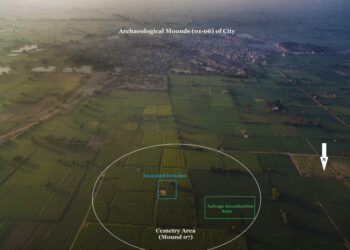India’s vibrant and growing population of young minds is ushering in a remarkable transformation in the country’s scientific landscape. The rising interest of the youth in science has become a catalyst for innovation and exploration, positioning India as a hub for cutting-edge discoveries and advancements.
Several factors have contributed to this surge in scientific spirit among the youth, including increased educational opportunities, the presence of inspiring role models, and government support. As India embarks on a journey of progress and self-reliance, the nation’s young scientists are set to make substantial contributions to the world of science and technology.
In this article, we delve into the emerging scientific spirit among India’s youth and the impact it holds for the nation’s future.
Factors Fuelling the Rise of Scientific Spirit
Enhanced Educational Opportunities: The Indian government’s significant investments in science education have opened doors to a wealth of educational opportunities for young minds. Access to quality education in science and technology has empowered the youth with knowledge and skills, creating a more competent and confident workforce.
Inspiring Role Models: India now boasts numerous successful scientists working in cutting-edge fields, serving as inspiring role models for aspiring young minds. These accomplished scientists not only motivate the youth to pursue scientific careers but also offer mentorship and guidance, nurturing the next generation of innovators.
Government Initiatives: The government of India has introduced several schemes and programs aimed at fostering innovation and creativity among the youth. These initiatives provide financial support, mentoring, and training to encourage the development of technological wonders and rational thinking.
India’s Youth and the Scientific Turf
The demographic dividend that India is currently experiencing is a result of its largest-ever adolescent and youth population. This demographic advantage offers a unique and invaluable opportunity to harness the country’s scientific potential and drive it towards unprecedented growth. The youth are the torchbearers of tomorrow’s innovation, and their enthusiasm for scientific exploration holds the key to India’s future success.
To channel this potential, the government has introduced transformative initiatives like Million Minds Augmenting National Aspirations and Knowledge (MANAK) and Promoting Innovations in Individuals, Startups, and MSMEs (PRISM). These programs aim to foster a creative thinking culture among students and young innovators, encouraging them to think outside the box and come up with groundbreaking ideas.
The Million Minds Augmenting National Aspirations and Knowledge (MANAK) initiative seeks to generate one million innovative ideas related to science, instilling a culture of creativity and curiosity among students from Classes 6 to 10. By providing these young minds with a platform to develop and showcase their ideas, MANAK empowers them to contribute to India’s scientific landscape. Themes like Digital India, Swachh Bharat, and Make in India are integrated into the program, encouraging students to think about real-world challenges and solutions.
The Promoting Innovations in Individuals, Startups, and MSMEs (PRISM) scheme, on the other hand, extends its support to individual innovators and startups, nurturing their ideas and giving rise to new enterprises. Through grants, technical guidance, and mentoring, PRISM fuels the transformation of innovative ideas into tangible products and services. This not only strengthens India’s scientific standing but also stimulates economic growth by promoting entrepreneurship and job creation.
Together, these programs are igniting the scientific spirit among the youth and reinforcing the idea that innovation is the key to India’s progress. By nurturing creative thinking, these initiatives are laying the foundation for a future where India emerges as a powerhouse of scientific and technological advancements.
The growing number of enthusiastic young minds eager to explore the frontiers of science and technology bodes well for India’s scientific future. As students are encouraged to think critically, experiment, and question, they develop a passion for discovery that extends beyond the classroom. This inquisitive spirit, when combined with the right guidance and support, has the potential to reshape India’s scientific landscape and position the country as a global leader in cutting-edge research and innovation.
Furthermore, such initiatives play a crucial role in cultivating a pool of skilled scientists and innovators, which is essential for India’s journey towards becoming a knowledge-driven economy. By empowering the youth to unleash their potential and think creatively, India is sowing the seeds for a generation of problem solvers and visionaries who will contribute significantly to the nation’s growth and development.
Fostering Innovation and Exploration
The Young Scientist Program, popularly known as YUVIKA, is a commendable initiative launched by the Department of Space and ISRO (Indian Space Research Organisation) with the aim of igniting the passion for space and science technology among young minds. YUVIKA offers a unique opportunity for talented youngsters to explore the fascinating world of space and technology through a comprehensive two-week residential training program. The program is carefully designed to provide participants with a fundamental understanding of space missions, satellite technology, and various scientific aspects related to space exploration.
During the training, the selected students get a chance to visit some of the most prominent ISRO centers, including the Vikram Sarabhai Space Centre (VSSC) in Kerala, U R Rao Satellite Centre (URSC) in Karnataka, Space Applications Centre (SAC) in Gujarat, and North Eastern Space Application Centre (NESAC) in Meghalaya. The visit to these esteemed centers exposes the young participants to real-world applications of science and technology and provides them with a rare opportunity to interact with accomplished scientists and researchers. Additionally, the program includes a visit to the Satish Dhawan Space Centre (SDSC) in Andhra Pradesh, where they witness rocket launches and experience the thrill of space missions.
YUVIKA focuses not only on imparting scientific knowledge but also on cultivating leadership skills, teamwork, and a spirit of exploration among the participants. By nurturing their innate curiosity and encouraging critical thinking, the program lays a strong foundation for their future scientific pursuits.
On a parallel front, Atal Tinkering Laboratories (ATL) are making waves across schools in India as they embrace the philosophy of fostering a culture of creativity, curiosity, and entrepreneurial thinking among young minds. Established as a part of the Atal Innovation Mission (AIM), ATLs are vibrant innovation hubs that provide students with hands-on learning experiences in the fields of science, technology, engineering, and mathematics (STEM).
ATLs offer a dynamic learning environment, equipped with state-of-the-art facilities and cutting-edge technology tools such as 3D printers, robotics kits, and electronics components. The labs are designed to stimulate the spirit of innovation, allowing students to experiment, tinker, and prototype their ideas. The ATL curriculum emphasizes practical application and problem-solving, encouraging students to design and build innovative solutions to real-world challenges.
Through ATLs, students are empowered to embrace failures as stepping stones to success, fostering resilience and a growth mindset. The labs serve as hubs of creativity and collaboration, where young innovators work together to explore the realms of science and technology.
The combined efforts of initiatives like YUVIKA and ATLs are instrumental in shaping a generation of young minds equipped with scientific knowledge, technical skills, and an entrepreneurial spirit. By providing them with such enriching experiences at an early age, India is nurturing a pool of future scientists, engineers, and innovators who are poised to drive the nation’s progress and contribute to solving global challenges.
Scientific Training and Research
Schemes like Support for Human Resource Academics and Research Programme (SHARP) and the esteemed Bhabha Atomic Research Centre (BARC) are instrumental in providing advanced training and research opportunities that foster a culture of exploration and innovation among health professionals and science graduates.
The Support for Human Resource Academics and Research Programme (SHARP) is an exemplary initiative introduced by the Indian Council of Medical Research (ICMR). Designed to facilitate advanced training for promising health research professionals, SHARP offers a pathway for medical graduates to delve into the world of research and contribute to cutting-edge advancements in the medical field. By providing opportunities for young researchers to delve into specialized areas, SHARP enables them to gain in-depth knowledge and expertise, fueling their passion for scientific exploration.
Through SHARP, talented health professionals are nurtured and encouraged to explore new frontiers in medical research. The program provides them with exposure to the latest scientific developments, methodologies, and technologies, empowering them to contribute to medical breakthroughs and advancements in public health. The support and resources offered by SHARP strengthen India’s medical research landscape and pave the way for innovations that address the country’s unique healthcare challenges.
On the other hand, the prestigious Bhabha Atomic Research Centre (BARC) is a leading institution in the field of nuclear research and development. Recognized for its pioneering contributions to science and technology, BARC plays a crucial role in providing advanced training and research opportunities for science graduates and professionals in various domains.
BARC’s orientation and training programs are specifically designed for employees and students affiliated with the Department of Atomic Energy (DAE). These programs extend to both science postgraduates and engineering graduates, who undergo comprehensive one-year courses at BARC’s training schools. By providing a platform for young scientists to hone their skills and knowledge in niche areas of science and technology, BARC nurtures the next generation of research talent.
The training programs at BARC expose participants to state-of-the-art research facilities, cutting-edge equipment, and eminent scientists in their respective fields. This exposure not only enriches their understanding of scientific principles but also ignites a passion for exploration and innovation. Through hands-on experiences and research projects, participants develop the analytical thinking and problem-solving abilities necessary to contribute to advancements in nuclear science, space technology, and related domains.
India’s youth, armed with their passion for science and technology, are leading the nation towards a future marked by innovation, discovery, and self-reliance. With an unwavering scientific spirit, young Indian scientists are poised to make groundbreaking contributions to the field of science and drive the country’s progress in the global arena.
As India nurtures the potential of its young minds through education, mentorship, and support, the nation’s scientific future shines brightly, paving the way for a technologically driven and prosperous India. The emerging scientific spirit among India’s youth is the catalyst for a brighter and more innovative tomorrow, where the nation’s young scientists will make their mark on the world stage.








